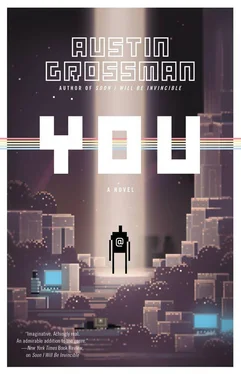And it came to me in a flash that Simon must have marched down the same hall to the same computer. I pictured Simon in the same scene, seated in front of the PET. He sensed this was it for him, a portal into the future—into his own future, into the only adult life he could bear to have. They’d handed it to him, saying, in effect, “We don’t know what this is, and we don’t even have time to figure it out; we’re busy being grown-ups and operating the mimeograph machine and pretty much making your lives possible.”
And Simon got it. He recognized its rigid limitations and its endless possibilities at the same time, and the daemon inside him told him how to answer the grown-ups: “Don’t worry. I know this doesn’t make sense to you, but it does to me. In fact, it’s the thing I’ve been waiting for, the thing that makes my private obsessions, all that thinking I do about numbers and other worlds and all of it, it’s the thing that makes it all work. Trust me, this is going to be great. And thank you.” Of course nobody said those things—it would take years and they’d never remotely understand each other anywhere near this well—but that’s what happened nonetheless.
Until now you didn’t realize. You were staring right at this thing, thinking it was a simulation game about a vicious four-sided intrastellar war. Whereas now you see it is a letter to the future.
I was combing the cometary halo for clues when Lisa came back with a number on a piece of paper.
“So that’s a big number,” she said. “Do you know how big?”
“I know that numbers with an e in them are big, but that meters are not big.”
She said, “It’s just short of a yottameter.”
“You’re saying nothing. These are just sounds.”
“A septillion meters. Yottameters are the largest unit in the metric system. It wouldn’t be inside the solar system. It wouldn’t be inside the galaxy. You’ll have to get farther.”
“Why don’t they need anything bigger than a yottameter?”
“Because the universe is only nine hundred and thirty yottameters wide, of course.”
“You’re making this up.”
“Why would I make it up?”
“Why would you know it in the first place? Consider yourself appointed to the intergalactic travel initiative. I have a war to fight.”
When you pile up enough Research Points, you get to choose a new technology to develop. Starting with Basic Fusion, you can move on to Biosphere Design, Holographic Computer Interface, Stellar Mechanics, Improved Social Engineering, and so forth. Every technology unlocks new choices about what you can learn next, so that if you take Fusion it leads to Improved Fusion or Gamma Radiation Beams or Pin-size Nuclear Missiles or Ultradense Matter Manipulation, and those open up more choices. It’s called the Technology Tree. Every technology allows a new kind of building or spaceship or ability. There’s a building tree that works the same way—basic buildings like biodomes and electric generators and factories are prerequisites for building more specialized production facilities, which allow new and different units, and so forth. Everything is interconnected in a complicated web. Some technologies are prerequisite for some buildings, and vice versa, and it all gates on other factors, like what materials are available—there’s no fusion without plutonium, for example.
So you lie in an empty cubicle by the far wall, a down sleeping bag pulled to your chin. It’s an old sleeping bag you lugged from home to college to your first apartment to the next to the next. It’s a pointless exercise, since you never go camping anymore, not since the seventh grade, and you never go to sleepovers or lie out all night in the backyard. The bag has probably never been washed in its entire lifetime, and it seems to smell like campfires and basement damp and sweat and the pee from a long-ago cat.
As you lie there your mind wanders in the darkness in a sleepy train of thought, in which the tech tree just keeps going and going, on past fusion and neural interfaces and planet-busting missiles into force fields and teleportation and hyperdrive, and then you’re falling asleep, and now you invent hypermancy and neuro-French and conceive of factories for s’mores and manifestos and you can breed superintelligent cats and fix the family station wagon, and then you even build your old elementary school and in the back of the principal’s office you find the portal to Mars that was so obviously there—why didn’t I think?—and you step through to Mars, where it’s the summer of 1977 forever, and you want to go back through the portal and tell everybody that guys, guys, this is it, I finally found it, but now the lights are on and it’s morning and the early-morning programmers are already at work.
The Dark Age passes, and the Second Terran Empire, and the Solar Tetrarchy emerges. Brendan Blackstar and Pren-Dahr fight to a stalemate. You discover the buried relics of a Precursor civilization at the Martian north pole. Tech bonus!
By this time you can speak the language of Solar Empires, a rock-paper-scissors exchange of moves and countermoves. You learn to deduce hidden information. You learn that, underneath it all, the world is just a way to turn water, minerals, and sunlight into spaceships and soldiers and scientists.
It’s time to leave. You build an enormous freighter and add a cylindrical biosphere whose construction costs a third of your resources per turn. When it’s ready, you sling it away from the sun. Your enemies make a last-ditch effort to knock it down before it passes Jupiter orbit, but they can only scratch the hull. Ley-R4 is on board, dreaming in stasis sleep as the system collapses into chaos behind her.
The Solar Age is at last over; the Pan-Stellar Activation begins.
It’s dawn, and in my mind I imagine Simon at work a decade ago, grinding out Solar Empires against the pressure of a Christmas deadline, stopping only when he’s half blind from tracing through his own code. “I’m never going to forget what this feels like,” he thinks, breathing the blue dawn air, stumbling once in the dirty, snow-crusted parking lot, “not if I become a famous movie star, not if I have a hundred hundred friends.” His car is the only one in the lot, the last ugly chocolate in the box. His hands are cramped, and at first he can’t really grab the steering wheel properly, he just kind of hooks his hands on. He starts the car, lets it run a minute before blasting on the heat, and crunches packed snow as he tears out of the lot.
He drives home, passing commuters going the opposite way, all part of a routine he’s become unstuck from, gone out of sync with, like a dimension traveler whose fantastic machine has jammed. This is what he wanted, isn’t it? To stay up late every night? To cut his own path, to laugh at the ones who didn’t have the imagination to invent their own lives, who were too afraid or too dim, the ones who didn’t know how to burn? But just at that moment, he remembers how much easier it had been the other way, like in high school, when he at least shared a temporal rhythm with the rest of humanity. But, he reflects, I hated that, too, hated it so much I learned C++, for heaven’s sake. He returns at five that afternoon, as the sun is setting on his last day.
I don’t know what happened. I don’t think Simon was trying to kill himself, or do anything else crazy. I think he had problems, but making games was probably the sanest thing he could do for himself, or for the rest of us. It’s probably stupid for me to feel this bad about someone I didn’t know that well, someone I had every chance and more to get to know. But he was never a dick to me, and the overwhelming likelihood is that he just didn’t have any experience having close friends, and I had no way to show him where to start. It was good that I now have the chance to see how cool he was. It’s possible that Simon may have saved my life.
Читать дальше





![Ally Carter - [Gallagher Girls 01] I'd Tell You I Love You But Then I'd Have to Kill You](/books/262179/ally-carter-gallagher-girls-01-i-d-tell-you-i-lo-thumb.webp)






